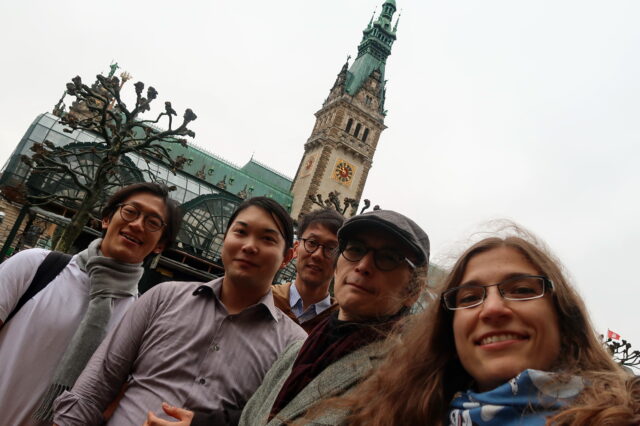Going through the array of notes and scribbles I produced over the course of this year’s Winter Institute, held between the 7th and 9th of November in Hamburg, at an unlikely host institution called The New Institute, I found myself circling back to the following:
We can no longer hold ourselves, our continuity; we only have rupture.
These were the words of Zhang Xudong, one of the main participants in the opening panel, which in turn was to set the tone for the following three days of presentations and discussions on our designated topic, i.e. “The Universal in Crisis”. If I recall correctly, the remark was made in passing, as Zhang brought the perspective of narrative to the table when he looked at the “subject” of crisis. Yet this particular remark ended up among the one-liners that most echoed with my own interpretations of the topic.
What is more, one could probably say it even articulated a recurring theme—from Elisabeth McClinton’s (ANU) talk about the divergence between the Global North and South in the process of academic knowledge creation, to Kohei Saito’s notion of “metabolic rift” as a theoretical anchor in his re-reading of Marx, and to the “severed wires” of globalization that Adhira Mangalagiri (NYU) problematized in her argument. Even on a meta-level, it seemed that the Winter Institute itself had suffered some version of “rupture.” Because of the COVID-19 pandemic, this was the first time since 2020 that the event could finally go back to its original face-to-face format. A lot has happened during these few years—and having to spend 14 hours non-stop in the air on our flight from Japan to Europe, almost going over the North pole, seemed to be symbolic of this fact. It was also particularly unfortunate that Peking University did not participate this time around.
Admittedly, the above-mentioned talks could all be considered attempts to “make sense” of the various states of “rupture” we are currently faced with, by delivering insight and/or proposing new conceptual frameworks to deal with them. In this sense, Markus Gabriel’s reference to a “mapping of crisis” could also be interpreted as an effort towards establishing connection in a state of wreckage (even though he chose not to elaborate on this further). Still, I find it difficult to say what exactly we ended up with as a result. Did all of this talk about “rupture” point us to a theoretical redemption of “continuity”? Or perhaps it instead led us to a critical reimagining of both? As far as the word “critical” has the potential to bring “self-reflective” and “at a point of crisis” together, and as far as imagination often provides a key to otherwise inaccessible dimensions of language, then I should probably say the latter.
Nevertheless, I also have to admit my bias. Searching for ways to approach the unsettling tensions between “rupture” and “continuity” has been an important task in my own research. This is why I had chosen Topologies of a Broken Discipline as the title of my presentation, where I focused on Japan’s China scholars and the constellation of crises that the WWII experience had brought to them and their ill-fated discipline (although the temptation to experiment with how my ideas could be positioned within an English context also contributed to the decision). In suggesting a topological approach, I aimed for those spaces where “rupture” and “continuity” co-exist; where it might be the case that people have lost hold of themselves, but that their interconnectedness with others accounts for a traceable “grip” of its own—with a particular history, dynamics, creative power. As if this was not confusing enough, I also shamelessly threw in some Bakhtin instead of a proper conclusion at the end. Ultimately, the significance that this abstract mess of an image holds within the concrete context of my research would have to be articulated in future discussions. As it turns out, 15 minutes are uninspiringly, yet universally, short.
What was infinitely inspiring though was the opportunity to spend so much time in such great company. In a rare moment of freedom from all things mundane, the UTokyo team shared a few great evenings together, coupled with chance encounters at breakfast, as well as a single but more than memorable attempt at sightseeing (we can now testify that Hamburg is indeed home to the second highest climbable cathedral in Germany and that the stairs leading up to the top of said cathedral are indeed not to be taken lightly). For the sincerity and the warmth, the thoughtful advice, the meaningful conversations, and the arguably even more meaningful laughs, I am nothing but grateful.
Before wrapping up, I suppose this is where I mention that I was originally doubtful as to whether I should be participating in this year’s Winter Institute (it is also where I thank Professor Tsuyoshi Ishii for the much-needed nudge). I am now glad that I did, but the thoughts which provoked those doubts are still there. To put things bluntly, I still wonder whether such costly and joyous experiences truly correspond to what the scholarly endeavor stands for (or at least what I wish to see it as standing for). In this and many other cases it will probably depend on what we choose to do with the experience going forward. Stay tuned, I guess?

Reported by Viktoriya Nikolova (EAA Research Assistant)








